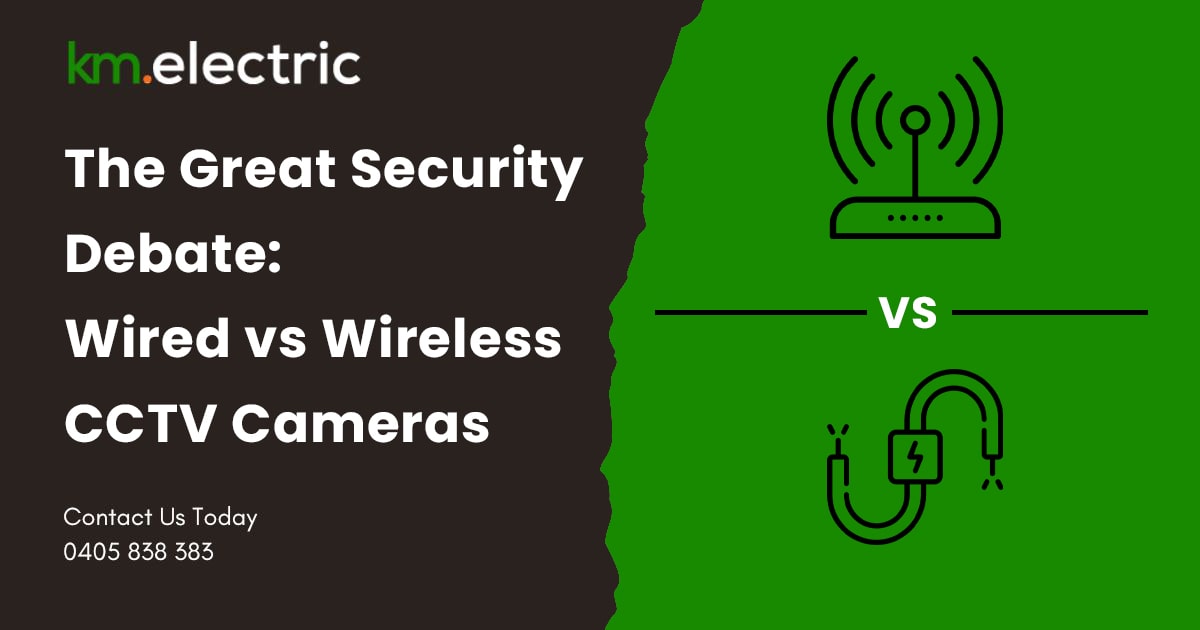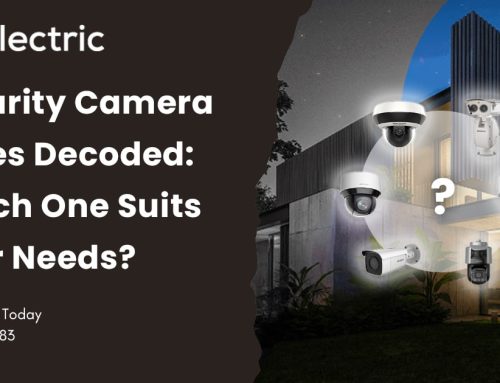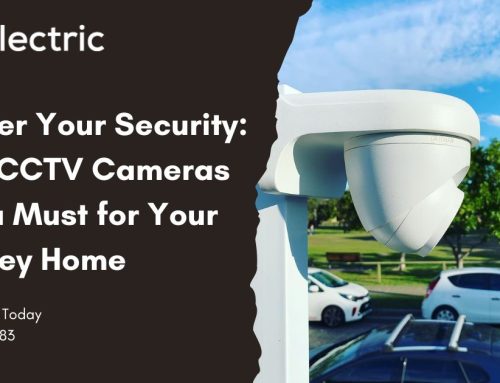Security cameras play a critical role in modern surveillance systems, offering peace of mind and enhancing safety for homes, businesses, and public spaces.
Whether your security system features wired or wireless cameras, either option acts as a powerful deterrent against criminal activity like break-ins and vandalism. The presence of security cameras alone can discourage potential intruders, enhancing overall security. Additionally, they enable the continuous monitoring and surveillance of residential and commercial areas, providing owners with valuable evidence in case of security breaches or suspicious activities.
With remote access features, users can view live footage and receive alerts on their smartphones, allowing for immediate action if needed. This convenience, coupled with the ability to protect family members, pets, and valuable assets, offers users peace of mind and assurance. Moreover, installing security cameras may lead to insurance benefits such as reduced premiums, further incentivising property owners to invest in robust security systems.
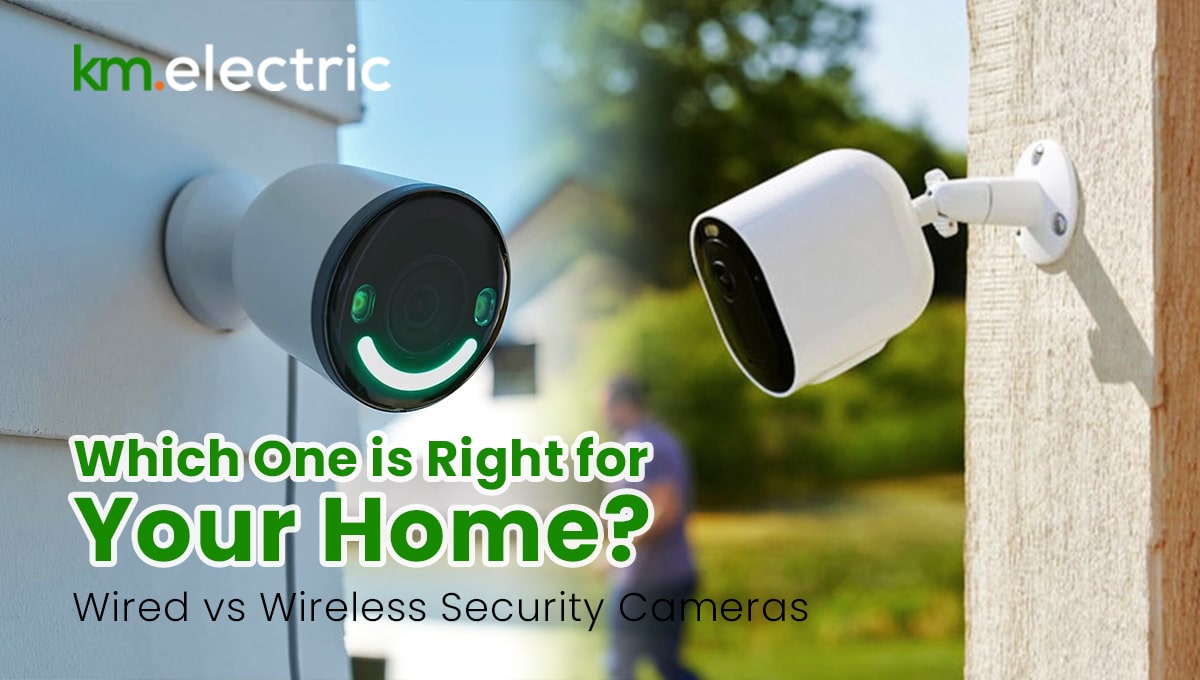
In choosing the right type for your property, you may need to make a wireless vs wired security cameras comparison. From the outset, the differences may not be so clear – except for the obvious “wireless” and “wired” designations.
So, if you’re trying to decide whether you should get wireless or wired security cameras for your home or commercial property, KM.ELECTRIC is here to assist. In this blog post, we’ll go over each type of surveillance camera in depth, so you can make an informed decision based on their features, pros and cons, and your own specific needs and preferences.
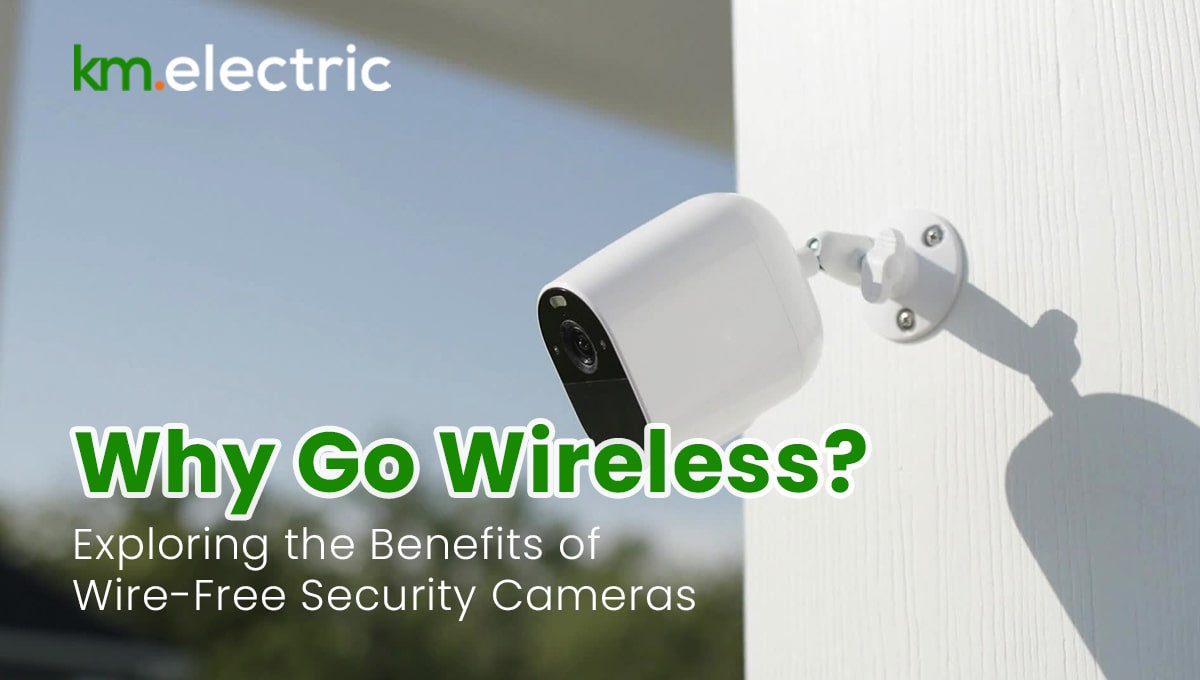
Wireless Security Cameras
Wireless security cameras are surveillance devices that transmit video and audio signals wirelessly, eliminating the need for physical cables to connect to recording devices or networks.
How Do Wireless Security Cameras Work?
A wireless security camera system uses Wi-Fi or other wireless technologies to connect to a local network or the internet. This allows for remote access and monitoring via smartphones, computers, and other dedicated systems.
Wireless CCTV cameras are used in a variety of settings and applications because of their flexibility, ease of installation, and remote monitoring capabilities. We usually find them in residential properties, commercial buildings, shops, public spaces (parks, streets, parking garages, transportation hubs, etc.), educational establishments, healthcare facilities, and industrial sites.
Benefits of Using Wireless Security Camera Systems
Surveillance cameras with Wi-Fi connectivity provide an easy and convenient way to monitor activities in a given area, as well as the following benefits:
- Flexibility and Easy Installation: Wireless cameras can be installed in various locations without the constraints of wiring, making them ideal for retrofitting existing spaces.
- Remote Access and Monitoring: Users can view live footage, receive alerts, and control camera settings remotely, enhancing convenience and accessibility.
- Expandability and Scalability: Wireless systems can be easily expanded by adding more cameras or accessories, offering scalability for growing surveillance needs, especially in commercial and industrial settings.
- Aesthetic Appeal: Wireless cameras are less obtrusive and visually appealing compared to wired counterparts, blending seamlessly into surroundings.
Disadvantages and Limitations of Wireless Security Systems
While wireless security cameras come with a host of benefits, they also have come with a few potential downsides:
- Interference and Signal Range: Wireless cameras may experience signal interference or range limitations, especially in areas with obstacles or wireless congestion.
- Power Source Dependency: Most wireless cameras require power sources, either through batteries or electrical outlets, which may need regular maintenance or replacement.
- Bandwidth Usage: Streaming high-definition video from multiple wireless cameras can consume bandwidth, affecting network performance and internet speed.
Best Wireless Security Camera Systems
The best Wi-Fi security cameras in Australia (and elsewhere) share several key features and qualities that make them reliable, effective, and user-friendly. Here are some essential features to look for when considering the best wireless security camera systems:
- High Definition (HD) Video Quality: Top-quality wireless cameras offer HD video resolution, providing clear and detailed footage for the accurate identification of people, objects, and activities.
- Wide-Angle Lens and Pan-Tilt-Zoom (PTZ) Functionality: A wide-angle lens allows for the broad coverage of areas, while PTZ capabilities enable users to adjust the camera viewing angle remotely, zoom in on specific details, and track moving objects.
- Night Vision and Low-Light Performance: Advanced wireless cameras are equipped with infrared (IR) LEDs or low-light sensors to capture clear footage in low-light conditions or complete darkness, enhancing round-the-clock surveillance.
- Motion Detection and Alerts: Motion detection sensors trigger instant alerts or notifications when motion is detected within the camera field of view, enabling prompt action, and the monitoring of suspicious activities.
- Two-Way Audio Communication: Built-in microphones and speakers allow for two-way audio communication between users and individuals near the camera, facilitating real-time conversations, warnings, or deterrence.
- Cloud Storage and Local Storage Options: Cloud storage solutions offer secure storage of video recordings in the cloud, providing accessibility, backup, and remote playback options. Some systems also support local storage via microSD cards or network-attached storage (NAS) devices.
- Mobile App Integration and Remote Access: Mobile apps compatible with iOS and Android devices enable remote access to live video feeds, playback of recorded footage, customisation of camera settings, and receiving alerts or notifications on smartphones or tablets.
- Smart Home Integration and Compatibility: Integration with smart home platforms such as Amazon Alexa, Google Assistant, or Apple HomeKit allows users to control cameras, view feeds on smart displays, and incorporate cameras into broader home automation routines.
- Encryption and Security Features: Strong encryption protocols (e.g., WPA2, AES encryption) and secure authentication methods ensure data privacy, protection against hacking or unauthorised access, and compliance with industry security standards.
- Weatherproof and Durability: The best wireless CCTV cameras for outdoor use are weatherproof (IP65 or IP66 rated) to withstand harsh weather conditions like rain, snow, heat, and humidity, ensuring long-term durability and reliable performance.
Several wireless security camera brands excel in the market by offering innovative features, reliable performance, and user-friendly interfaces. Some examples of top-rated wireless security camera brands include Wyze, Swann, Eufy Security by Anker, Arlo, and many more.
By considering these features and qualities, homeowners can select the best wireless home surveillance system. Using this guide, owners of commercial and industrial properties can also find the right wireless security camera system that meets their specific surveillance needs, provide advanced functionalities, and deliver peace of mind.
Wireless CCTV FAQs
Here are some common questions about wireless CCTV systems with answers:
Are wireless security cameras battery powered?
Many wireless security cameras are battery powered, offering flexibility in placement without the need for electrical wiring. However, some models may also have the option for wired power connections for continuous operation.
Are wireless cameras secure?
Wireless cameras can be secure if they employ strong encryption protocols, secure authentication methods, and regular software updates to patch vulnerabilities. This is why it’s important to choose reputable brands and follow best practices for securing your network and camera settings.
Can wireless security cameras be hacked?
Like any connected device, wireless security cameras can be vulnerable to hacking if not properly secured. To minimise the risk of hacking, use strong passwords, enable two-factor authentication, update firmware regularly, and secure your Wi-Fi network.
Do I need the internet for wireless security cameras?
While internet connectivity is not always required for basic functionality (e.g., local recording, live viewing within the same network), internet access is essential for remote monitoring, cloud storage, firmware updates, and accessing camera settings via mobile apps.
How far away can a wireless security camera work?
The range of a wireless security camera depends on factors such as the Wi-Fi signal strength, obstacles, and interference. Typically, cameras can work effectively within a range of 100 to 300 feet (about 30 to 90 metres) from the router or access point, but this can vary based on the specific camera model and environmental conditions.
How often do you have to charge wireless security cameras?
The frequency of charging wireless security cameras depends on factors such as camera usage, battery capacity, and power-saving settings. Some cameras may require weekly or monthly recharging, while others with larger batteries can last several months before needing a recharge or replacement.
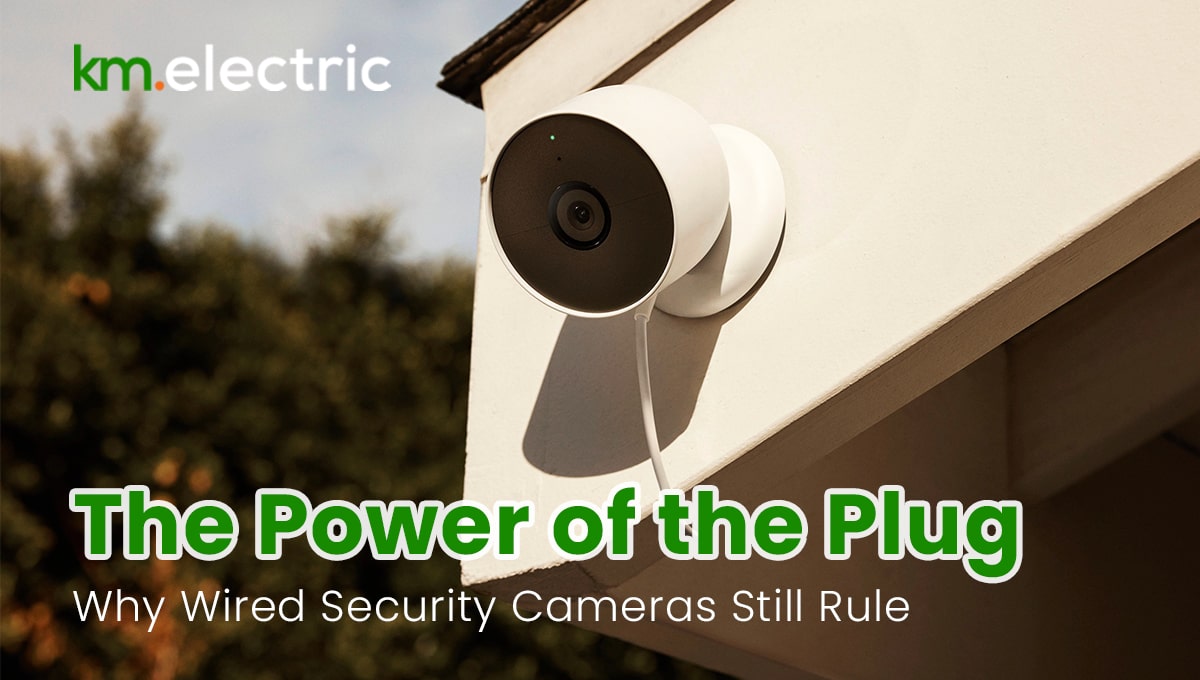
Wired Security Cameras
Wired security cameras are surveillance devices that require physical connections to power sources and recording equipment via cables. They transmit video and audio signals through wired connections, such as Ethernet cables or coaxial cables. They are an integral part of robust surveillance systems, offering reliable and continuous monitoring for various settings.
To know more about wired security camera systems, below are some specifics about their functionality, benefits, drawbacks, and best features.
How Do Wired Security Cameras Work?
Wired cameras use cables to connect to power outlets for continuous power supply and to recording devices, such as digital video recorders (DVRs) or network video recorders (NVRs), for storing and managing video footage. They may also utilise power over Ethernet (PoE) technology for simplified installation and connectivity.
Benefits and Advantages of Wired Security Camera Systems
Opting for a wired security camera system comes with the following benefits and advantages:
- Reliable Connection: Wired cameras offer a stable and uninterrupted connection, minimising signal interference or disruptions compared to their wireless counterparts.
- Continuous Power Supply: With direct power connections, wired cameras don’t rely on batteries, ensuring continuous operation without the need for frequent recharging or replacements.
- High Resolution and Quality: Many wired cameras support high-definition (HD) and even 4K video resolution, providing clear and detailed footage for accurate surveillance.
- Enhanced Security: Wired systems are less susceptible to hacking or signal interception compared to wireless systems, making them more secure for sensitive applications.
- Longevity and Durability: Wired cameras are designed for long-term use and can withstand harsh environmental conditions.
Disadvantages and Limitations of Wired Security Systems
Despite their strengths, wired security camera systems also have some disadvantages and limitations:
- Installation Complexity: The installation of wired security cameras may require professional assistance and drilling for cable routing, which can be time-consuming and labour-intensive.
- Limited Flexibility: Once installed, wired cameras are stationary and may not offer the same flexibility in placement or relocation as wireless cameras.
- Potential Cable Management Issues: Managing and concealing cables can be challenging, especially in retrofitting existing buildings or outdoor installations.
Best Wired Security Camera Systems
The best wired security camera systems possess the following features:
- PoE Support: Wired cameras with PoE capability allow for both power and data transmission over a single Ethernet cable, simplifying installation and reducing cable clutter.
- DVR/NVR Compatibility: These cameras are compatible with DVRs or NVRs for recording and storing video footage, offering scalable storage solutions.
- Stable and Reliable Connection: Wired cameras provide a stable and reliable connection with minimal signal interference or disruptions, ensuring continuous surveillance without Wi-Fi-related issues.
- Customisable Recording Settings: Users can customise recording settings such as motion-triggered recording, scheduled recording, or continuous recording based on their surveillance needs and preferences.
- Local Storage Options: In addition to DVR/NVR storage, wired cameras may offer local storage options via microSD cards or external hard drives for backup and redundancy.
- Long-Term Cost Efficiency: While their initial installation may require professional assistance and cabling, wired camera systems often have lower long-term maintenance costs and no ongoing battery replacement needs compared to wireless systems.
- Tamper-Resistant Design: Many wired cameras feature tamper-resistant designs, sturdy construction, and vandal-proof housing for enhanced durability and protection against tampering or sabotage attempts.
- Integration With Existing Systems: Wired camera systems can integrate seamlessly with existing security systems, access control systems, and smart home automation platforms for comprehensive security solutions.
- Multi-Camera Setup: Wired camera systems support multi-camera setups, allowing users to monitor various areas or angles simultaneously from a centralised location.
- Professional-Grade Features: Top-rated wired cameras may include professional-grade features such as advanced analytics (e.g., facial recognition, object detection), PTZ controls, and third-party integrations for enhanced functionality and customisation.
Reputable CCTV brands in Australia like Hikvision CCTV, Dahua security cameras, Ring, HiLook, and Uniview security systems are known for their quality, reliability, and innovation in the field of wired security camera systems, making them top choices for residential, commercial, and enterprise customers seeking robust surveillance solutions.
Wired CCTV FAQs
Can wired security cameras be hacked?
While it’s true that wired security cameras are generally more secure than wireless cameras, they can still be vulnerable to hacking if not properly secured. To minimise the risk of hacking, use strong passwords, enable two-factor authentication, update firmware regularly, and secure your network and camera settings.
Can wired security cameras be jammed?
Wired security cameras are less susceptible to signal jamming compared to wireless cameras because they rely on physical cables for data transmission. However, in rare cases, sophisticated jamming devices may interfere with wired camera signals.
How are security cameras wired?
Security cameras are wired using cables such as Ethernet cables (for IP cameras) or coaxial cables (for analogue cameras). The cables connect the cameras to power sources for electrical supply and to recording devices (DVRs or NVRs) for storing and managing video footage.
How much does it cost to install wired security cameras?
The cost of installing wired security cameras varies depending on factors such as the number of cameras, type of cameras (IP or analogue), installation complexity, and labour costs. On average, professional installation of wired security cameras can range from a few hundred to several thousand dollars.
How do you hide security camera wires?
To hide security camera wires, you can:
- Use cable raceways or conduits to conceal wires along walls or ceilings.
- Route wires behind furniture, curtains, or decorative elements.
- Drill holes and run wires inside walls for a cleaner look (best done with professional assistance).
- Use wire clips or ties to secure and organise wires neatly.
Wireless Security Cameras vs Wired: Cost Comparison
In the wireless security cameras vs wired comparison, you’ll need to weigh the system costs and benefits, as well as installation expenses.
Wireless Security Cameras
- Initial Cost: Wireless cameras often have lower upfront costs as they require fewer cables and less labour-intensive installation.
- Equipment Cost: Wireless camera systems typically include cameras, a base station or receiver, and possibly additional accessories like batteries or solar panels.
- Flexibility: Wireless systems offer flexibility in camera placement and scalability, allowing for easy expansion of the system.
- Maintenance: Wireless systems may have lower maintenance costs over time, but battery replacement or recharging expenses should be considered.
- DIY Installation: Many wireless systems are designed for DIY installation, reducing labour costs.
- Simplified Setup: Wireless cameras require fewer cables and may use Wi-Fi or cellular connections for data transmission.
- Placement Flexibility: Wireless cameras can be placed almost anywhere within wireless range, offering flexibility in camera placement.
Wired Security Cameras
- Initial Cost: Wired cameras may have higher initial costs due to the need for cables, power sources, and potentially professional installation.
- Equipment Cost: Wired camera systems include cameras, cables, power supplies, and recording devices (DVRs/NVRs).
- Reliability: Wired systems are known for their reliability and stability, with consistent power supply and no signal interference issues.
- Long-Term Cost: While installation costs may be higher, wired systems often have lower long-term maintenance costs and no ongoing battery replacement needs.
- Professional Installation: Wired systems often require professional installation for cable routing, power connections, and setup of recording devices.
- Complex Setup: Wired cameras may involve drilling, cable management, and coordination with electrical systems, increasing installation complexity.
- Limited Placement: Wired cameras are stationary once installed, with limited flexibility in relocation compared to wireless cameras.
So, Are Wired or Wireless Security Cameras Better?
Should you get wired or wireless security cameras?
Generally speaking, our expert advice is to opt for wired security cameras; however, the choice between wired and wireless security cameras depends on personal preference as well as a range of factors, such as:
- Budget: Consider upfront costs, installation expenses, and long-term maintenance costs.
- Property Layout and Camera Placement: Evaluate the property layout, distance from power sources, and desired camera locations.
- Stability and Reliability: Assess the importance of uninterrupted surveillance, signal stability, and resistance to interference.
- Personal Preferences: Assess your preferences for DIY installation, system flexibility, and scalability.
Can You Mix Wired and Wireless Security Cameras?
Yes, it’s possible to combine wired and wireless security cameras within the same surveillance system.
This hybrid approach allows users to leverage the benefits of both types of cameras, such as the reliability of wired cameras and the flexibility of wireless cameras. However, make sure to assess compatibility and consider integration with recording devices and monitoring software when mixing camera types.
How KM.Electric Can Help Sydney Customers
At KM.Electric, we specialise exclusively in the installation of wired security camera systems. We have several compelling reasons for this focus, which we’re eager to discuss in detail when you contact us.
A professional wired security camera system installation delivers comprehensive security solutions, peace of mind, and enhanced protection for homes, businesses, and properties. It combines expertise, quality equipment, customisation options, compliance assurance, and ongoing support to help people safeguard their assets, monitor activities, and respond effectively to security threats.
With KM.ELECTRIC, you get all these, and more.
We’re your reliable home security camera installation partner in Sydney.
You can also depend on us for installing outdoor security lights and solid security systems, as well as a range of electrical services.
Contact us today!

